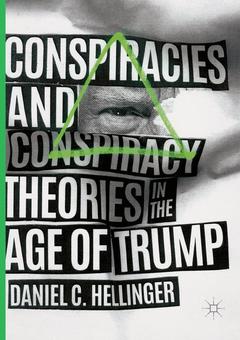Conspiracies and Conspiracy Theories in the Age of Trump, 1st ed. 2019
Auteur : Hellinger Daniel C.

Table of Contents
Preface
Chapter 1 Introduction: Conspiracy Theory versus Theorizing Conspiracy
Return of the Paranoid Style in American Politics
What We Know from Survey Research
Conspiracy and Conspiracy Theory Defined
The Paranoid Style and Populism
Trumpian Conspiracy Theories
An Outline of the BookChapter 2Paranoia, Conspiracy Panic, and the Regime of Truth
I’m Not a Conspiracy Theorist, but…
The Shadow of Hofstadter
The Regime of Truth
Fake News
Historians, Social Scientists and “Proving” Conspiracy Theory
A Typology of Conspiracy Theories
JFK, 9/11 and the Regime of Truth
Consequences and Summing Up
Chapter 3 Trumpism, Fake News and the “New Normal”
Populism, Paranoia and Celebrity
Fake News
Mueller’s Conspiracy Theory and the Media
Conspiracy Theory, Fusion, and the Alt-RightConspiracism and Threats to Democracy
Chapter 4Suspicious Minds, the 2016 Election and Its Aftermath
Reading Voters’ Entrails
Populism and Election 2016
Fake News and Russian Intervention in Election 2016
The Year of Voting Dangerously
Partisan Conspiracy Beliefs
Social Immobility and Unresponsive Elites
Globalization, Economic Distress and the Vote
Suspicion and the Vote
Chapter 5 Globalization, Populism, Conspiracism
Suspicious Minds in the New World Order
Immigrants, Nativism, and Trump
Wall Street and Monassen PA
Transnational Capitalism and the Nation State
Nationalism, Economic Discontent, Geographical Stress in Election 2016
Populism versus Transnational Capitalism
Conclusion: The Great Disrupter
Chapter 6 Dark Money and Trumpism
Money, Politics and Trump
Dark Money and Billionaire Cabals
Show us the Dark Money Trail
Conspiracy Panic and Muckraking
Corruption in a Republic of Money
Dark Money as a Sphere of Conspiracism
Conspiracy or Just Plain Old Interest Group Politics?
Chapter 7 The Deep State, Hegemony, and Democracy
What is the Deep State? What is it Not?
Parapolitics
The Conspiratorial Roots of National Security and InstitutionsDonald Trump and the Deep State
Conspiracy Fiction, Conspiracy Reality
Parapolitics and Blowback
Parapolitics, the Deep State and Russiagate
Chapter 8 Conclusion: Conspiracy Theories and Political Decay
Needed a New Regime of Truth
What We Can Learn from Conspiracism Abroad
A Research Agenda
Last Words: No Time to Panic
Daniel C. Hellinger is Professor Emeritus of Political Science at Webster University, USA. He has previously published: “Paranoia, Conspiracy, Hegemony in American Politics” in Transparency and Conspiracy: Ethnographies of Suspicion in the New World Order (2003) and “Conspiracy Theory and the Paranoid Style” in American Political Culture: An Encyclopedia (2015), and co-authored The Democratic Façade (2nd edition, 1991). His most recent books are Comparative Politics of Latin America: Democracy at Last? (2014), Global Security Watch: Venezuela (2012), and, as co-editor and contributor, Bolivarian Democracy in Venezuela: Participation, Politics and Culture (2011).
Makes the case that Trump’s presidency demands that conspiracies and conspiracy theories be taken more seriously by political scientists and academics, not simply discarded as social paranoia
Argues that conspiracies are connected in important ways to fake news, political corruption, surveillance of citizens, and other threats to democracy in the age of Trump
Finds paranoid conspiracy theories are as likely to be peddled by elites as by populist movements
Date de parution : 12-2018
Ouvrage de 300 p.
14.8x21 cm
Disponible chez l'éditeur (délai d'approvisionnement : 15 jours).
Prix indicatif 52,74 €
Ajouter au panierThèmes de Conspiracies and Conspiracy Theories in the Age of Trump :
Mots-clés :
paranoid style; Trumpism; paranoia; conspiracism; global order; populism; conspiratorial behavior; populist; suspicion; hegemony; decline; Deep State; Cold War; security; regimes of truth; fear; us politics



